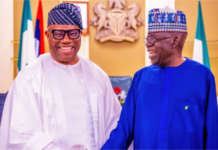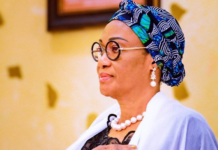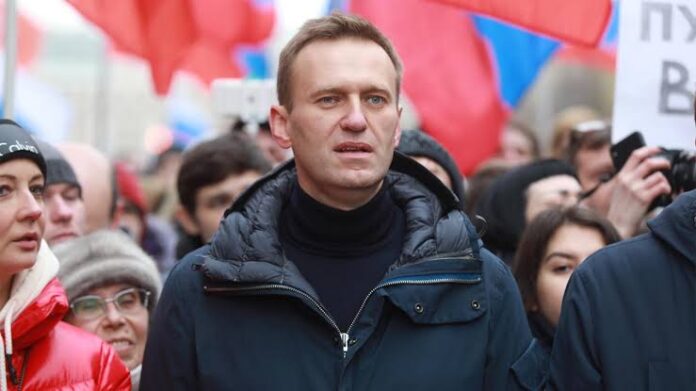‘Let there be no doubt: Putin is responsible,’ Biden said. European leaders such as Von der Leyen, Macron and Scholz also pointed the finger at the Russian government
The Russian prison authorities’ announcement of opposition leader Alexei Navalny’s death has triggered a cascade of reactions from Western leaders. With necessary caution in light of the unreliability of the source of the news, different European and American political leaders have all pointed out the responsibility of Vladimir Putin’s regime. This represents a dramatic new escalation in the tensions between Russia and the West, which the Kremlin has taken to a level not seen for decades with its full-scale invasion of Ukraine.
“Make no mistake, Putin is responsible for Navalny’s death,” U.S. President Joe Biden said in an on-camera statement at the White House after the news broke. The Democrat said that although the exact circumstances of what happened are unknown “there is no reason to doubt” the opposition leader’s death, but he avoided asserting that it was an assassination. Nevertheless, he reiterated that Navalny’s death was undoubtedly “the consequence of something that Putin and his thugs did.”
“Let no one be under any illusions. Putin not only targets the citizens of other countries, as we see with what’s going on in Ukraine right now, he also inflicts terrible crimes on his own people,” Biden noted. “People in Russia and across the world are mourning Navalny today because he was so many things that Putin is not. He was brave. He was principled. He was dedicated to building a Russia where the rule of law existed and where it applied to everybody.” The president also cited the opposition leader’s death as another reason for the U.S. Congress to immediately approve aid to Ukraine, which requires approval by the House of Representatives.
News of Navalny’s death influenced the start of the Munich Security Conference, a forum that brings together political, military and diplomatic leaders from much of the world. The Russians had participated in the past but are no longer invited in the wake of Putin’s full-scale invasion of Ukraine. In the Bavarian capital, U.S. Vice President Kamala Harris was categorical: “If confirmed, this would be a further sign of Putin’s brutality. Whatever story they tell, let us be clear. Russia is responsible,” she emphasized. Also in Munich, U.S. Secretary of State Antony Blinken said that “[Navalny’s] death in a Russian prison and the fixation and fear of one man only underscores the weakness and rot at the heart of the system that Putin has built. Russia’s responsible for this.”
EU leaders have been equally forceful in their statements. “The EU holds the Russian regime solely responsible for this tragic death,” President of the European Council, Charles Michel, wrote on X (formerly Twitter) as soon as the news broke. The reaction of the former Belgian Prime Minister was one of the first condemnations and has shaped the path followed by many of the leaders of the Member States and top EU officials. Ursula von der Leyen, President of the European Commission, commented that “Putin fears nothing more than dissent from his own people. A grim reminder of what Putin and his regime are all about.” Similarly, the EU High Representative for Foreign Affairs and Security, Josep Borrell, who was also in Munich, asserted on his official X account: “Putin is responsible for [the] murder & will be accountable.”
The world has lost a fighter whose courage will echo through generations.
Horrified by the death of Sakharov Prize laureate Alexei Navalny.
Russia took his freedom & his life, but not his dignity.
His struggle for democracy lives on.
Our thoughts are with his wife & children. pic.twitter.com/JMSAkLpb0T
— Roberta Metsola (@EP_President) February 16, 2024
In Munich, NATO Secretary General Jens Stoltenberg stated that “All the facts [have] to be established and Russia has serious questions to answer. Alexei Navalny has been a strong voice for freedom, for democracy for many years, and NATO and NATO Allies have called for his immediate release for a long time.”
Navalny’s wife, Yulia, also reacted from Munich, giving a short speech right after U.S. Vice-President Harris spoke. Visibly shocked but strong, the widow addressed an audience full of leaders after much applause.
“I am sure that, in my position, Alexei would have decided to get up on this stage at this moment. I don’t know whether we should believe the terrible news we’ve only received from official media. For many years, they have lied constantly. But if it is true, I want Putin and his team to know that they will be punished for what they have done to our country and to my family. They will be brought to justice. That day will come soon. I call on the entire international community to unite, to fight this evil, horrible regime,” the dissident’s wife said.
Beyond Munich, European leaders expressed similar outrage from their respective capitals. “He stood up for democracy and freedom in Russia – and apparently paid for his courage with his life. This terrible news shows once again how Russia has changed and what kind of regime is in power in Moscow,” noted German Chancellor Olaf Scholz. French President Emmanuel Macron wrote on X “In today’s Russia, free spirits are sent to the Gulag and condemned to death. Anger and indignation.” The Prime Minister of the Netherlands, Mark Rutte, also blamed Moscow, noting that Navalny’s death “shows the extraordinary brutality of the Russian regime.”
Alexei Navalny was an advocate for democracy and human rights.
His tragic death again underscores why we will continue to support #Ukraine
Russia will not prevail in Ukraine.
Our thoughts are with the family and friends of @navalny and all brave Russian political prisoners. https://t.co/L6nW0E0Wwq
— Alexander De Croo 🇧🇪🇪🇺 (@alexanderdecroo) February 16, 2024
In 2021, Navalny won the European Parliament’s Sakharov Prize awarded for freedom of thought. By that time, he was already in prison and could not go to receive the prize in person. The honor was bestowed on him “for his immense courage” in denouncing the “corruption of Vladimir Putin’s regime.” The President of the European Parliament, Roberta Metsola, noted in a message on X that she was “horrified” and that “the world has lost a fighter whose courage will echo through generations… His struggle for democracy lives on.”
Charles Michel also emphasized that facet of the activist: “Alexei Navalny fought for the values of freedom and democracy. For his ideals, he made the ultimate sacrifice.” The President of the European Council ended his message with a solemn sentence: “Fighters die. But the fight for freedom never ends.” Likewise, Belgian Prime Minister Alexander de Croo observed: “Alexei Navalny was an advocate for democracy and human rights. […] Our thoughts are with the family and friends of Navalny and all brave Russian political prisoners.”
EL PAÍS





